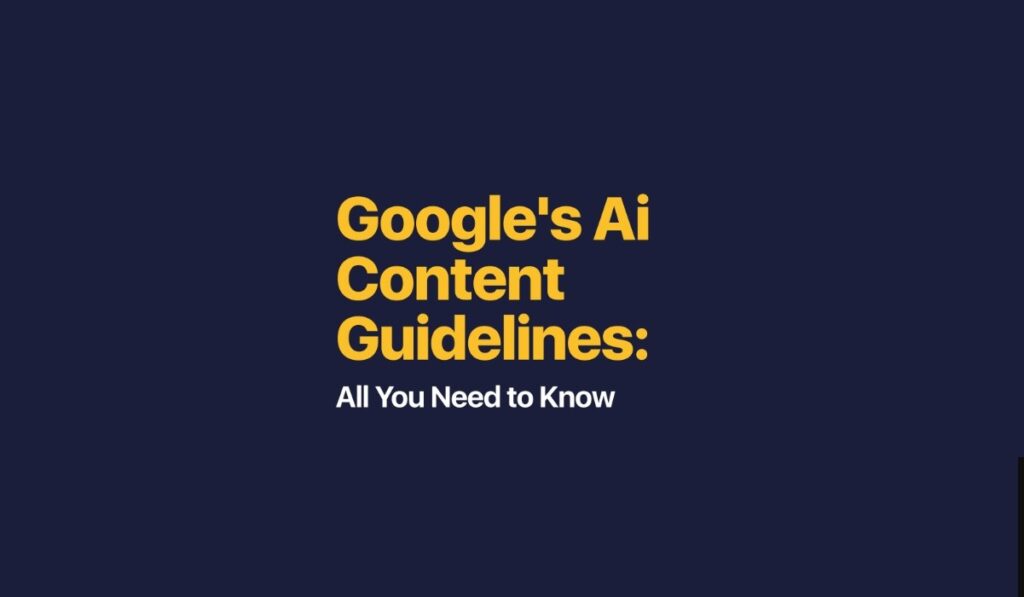Google recently unveiled their new guidelines on content creation, which outline their vision for the future of AI-generated content and the ethical implications of its use. It’s a bold step forward for Google and the technology industry as a whole and is sure to be a hotly debated topic for years to come. Let’s take a look at what these new guidelines mean for businesses, creators, and users and explain how AI-generated content impacts SEO in Sydney.
How AI Has Transformed SEO Content Creation:
The use of AI in content creation has been on the rise over the past few years. AI has allowed content creators to produce more targeted and higher-quality content that is tailored to a specific audience. It also helps them save time by automating certain aspects of the content creation process, such as researching keywords and topic ideas.

AI can be used in many ways to improve the quality of SEO content. For instance,
- AI can be used to identify relevant keywords and topics related to a given search query, making it easier to create optimised content for search engines.
- AI can also analyse and extract insights from data gathered from a variety of sources, such as websites, social media, and more. This data can then be used to create content that is optimised for SEO, as well as personalised content tailored to the reader.
AI can also be used to automatically generate content from scratch. This type of AI-generated content is becoming increasingly popular, as it can help you create content in less time. The use of AI has transformed the industry, allowing for faster and more accurate creation of SEO-friendly content.
So, Is AI the Future of Content Creation? Well, Not So Fast!
Just because AI lets you create more content in a given time doesn’t mean you can fully rely on it just yet. Even though Google doesn’t dispute the idea of using AI-generated content, it strongly advises creators against generating content only to manipulate search ranks. Doing so is a violation of the search engine giant’s spam policies.
According to the SEO experts in Sydney, you’d still need manual intervention when actively using AI tools for content creation. This ensures that your content meets the quality standards and is free from errors.
What’s Google’s Take on AI Content Generation?
Here are some key points to remember:
- Using AI technology appropriately and responsibly wouldn’t have any detrimental effect on your SEO content marketing campaigns.
- Google emphasises that the content you create should be helpful to your audience. As long as your content is useful and it complies with the SEO guidelines, your website wouldn’t be blacklisted or flagged for spam.
- Google explains that they’ve had proper systems in place to analyse content quality. Regardless of whether the content is created by human or AI, Google’s intelligent systems can monitor and filter out content that are less helpful to the users.
How Google Knows If You Are Using AI to Manipulate Search Results:

To offer a better search experience for its users, Google launched what is known as SpamBrain in 2018. This tool is specifically used to detect spam content, and thus far, it has been able to keep 99% of the searches spam-free!
According to the leading SEO consultants in Sydney, the algorithm evaluates each website or page and assigns a score based on how well the page or website meets user expectations. If the page or website is deemed too spammy or low quality, it will receive a lower score. The higher the score, the more likely it is that the page or website will be featured in the search results.
SpamBrain is especially effective in the era of AI content creation. No matter how you produce your content, be sure that it is useful for your audience and not search engines.
The Solution Is Plain and Simple – Create Helpful, Quality Content
Google rewards content that offers a delightful experience to its users. An SEO specialist in Sydney suggests making content with users’ needs in mind rather than spamming for better search engine ranks. Doing the latter will only backfire in the long run.
So, how do you go about creating helpful content? This is where Google’s E-E-A-T comes to play.
E-E-A-T stands for:
- Experience
- Expertise
- Authoritativeness
- Trustworthiness
Experience: The one aspect that sets AI content apart from humans is experience. Writing content on a topic based on your first-hand experience is something that can be achieved only by humans.
Expertise: Expertise refers to the level of knowledge and skill required to create high-quality content. This includes expertise in the specific subject matter, as well as related topics. Google looks for content from sources that have proven knowledge and experience in the subject they are writing about.
Authoritativeness: Google looks at factors such as links from other reputable websites, social media engagement, and mentions by well-known authors to evaluate the authority of a website or piece of content.
Trustworthiness: Trustworthiness is closely linked to authority and is used to measure the reliability of a source. Google picks sources that are reliable and trustworthy, such as well-known publications or websites that have been around for some time.
Any content that meets these aspects of Google’s E-E-A-T algorithm has the potential for good ranks, irrespective of how it’s produced.
Leveraging AI technology for SEO content creation is great, but one should keep Google’s search and spam guidelines in mind to stay out of trouble. Talk to the best SEO company in Sydney to know more.




 '
'